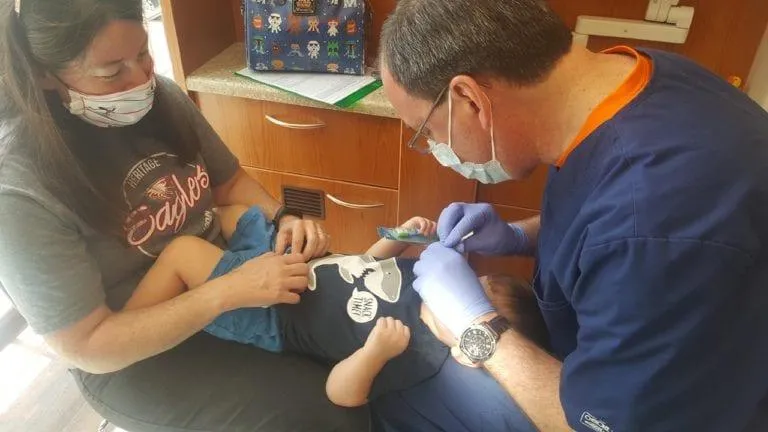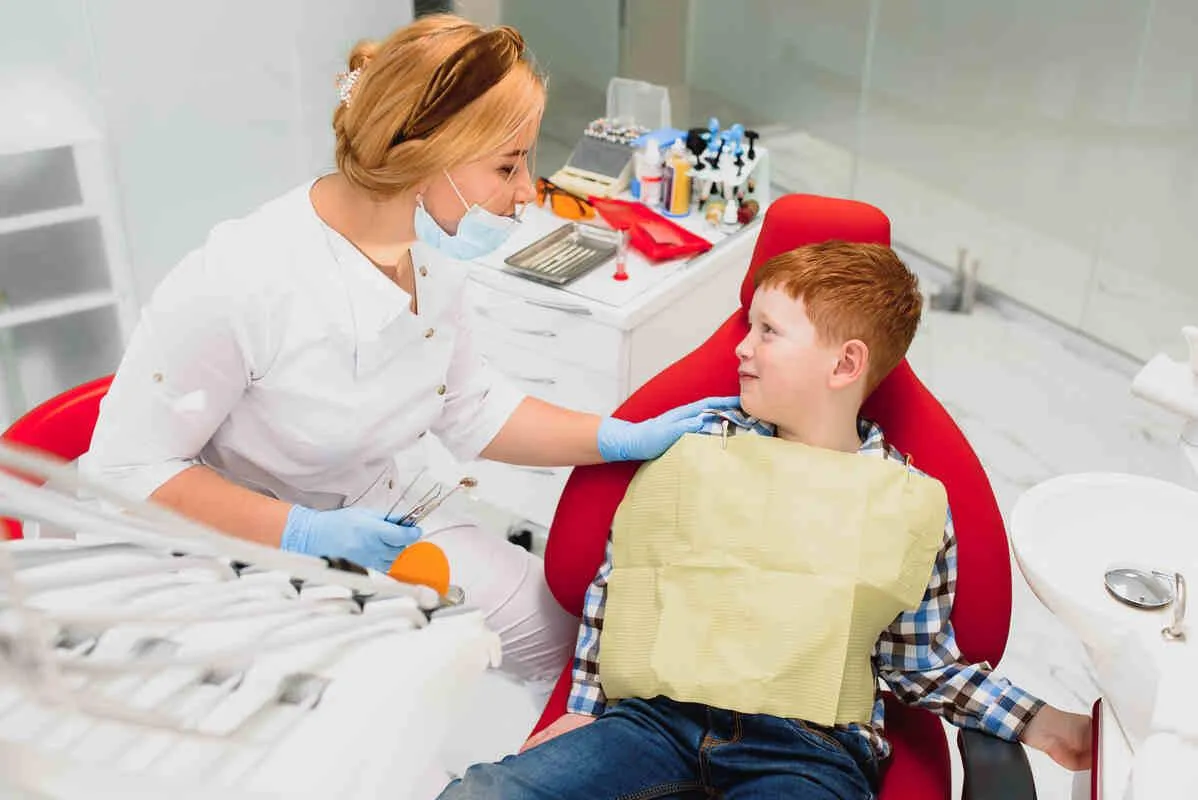WELCOME TO
HURST PEDIATRIC DENTISTRY!
Here at the pediatric dental office of Dr. Joby Hurst, we take pride in offering our young patients the highest quality of dental care in a kid-friendly environment. We are conveniently located in Birmingham, Alabama and are experienced in providing routine dental care for infants, children, teens and patients with special needs.
Dr. Hurst and his team of friendly professionals work together to provide a positive dental experience that will make your child smile! We promise to work with you and your child personally and create a customized treatment plan to meet your individual needs and desires.
Office tour
Early Dental Care
We believe early dental care can promote a lifetime of healthy smiles for your child. We offer a full range of services from routine dental exams and cleanings to fillings, sealants and fluoride treatments that will help ensure that your child grows up with a healthy smile.
Sedation Dentistry
We recognize that for some of our patients, a visit to the dentist makes them a bit nervous.
We offer nitrous oxide sedation for our more apprehensive patients, so they can relax while receiving the dental care that they need.
For those requiring more intensive treatment, Dr. Hurst offers in office anesthesia using Dr. Jeff Plagenhoef.
Dr. Jeff is a board-certified pediatric anesthesiologist with Pediatric Dental Anesthesia Associates.
We appreciate your interest in our practice and encourage you to continue exploring our website to learn more about us. Feel free to contact us to schedule an appointment with Dr. Joby Hurst today!

Blogs and Resources

Creating a Comfortable Dental Experience for Your Neurodivergent Child
Every parent wants their child to feel safe, comfortable, and confident at the dentist — but for families of neurodivergent children, even a routine visit can feel overwhelming.
Whether your child is autistic, has sensory processing differences, or experiences heightened anxiety, finding a dental environment that truly understands their needs can make all the difference. From bright lights and strange sounds to unfamiliar people and routines, a typical dental visit can quickly turn into a stressful experience.
That’s where compassionate, specialized care matters most.
At Hurst Pediatric Dentistry, we believe every child deserves a dental experience that meets them exactly where they are. Our approach to neurodiversity pediatric dentistry is rooted in patience, personalization, and play — creating an environment where even the most sensitive children can feel calm, heard, and supported.
In this guide, we’ll walk you through proven dental tips for neurodivergent children, show you what a special needs pediatric dentist offers, and share strategies that can transform fear into confidence — both in the office and at home.
What Is Neurodiversity in Pediatric Dentistry?
Neurodiversity is a term that celebrates the natural variations in how people think, feel, and interact with the world. It includes children with autism, ADHD, sensory processing disorder (SPD), and other neurological differences. These differences don’t represent deficits — they simply mean that some children experience and respond to the world in unique ways.
When it comes to pediatric dentistry, understanding neurodiversity is essential. A typical dental visit can present a range of unexpected challenges: bright lights, loud noises, unfamiliar textures, and even the smell of fluoride can be overstimulating for a neurodivergent child. Add in communication differences or past negative experiences, and it’s easy to see why many families hesitate to schedule dental care.
This is where neurodiversity pediatric dentistry steps in.
A dentist trained in working with neurodivergent children understands more than just teeth — they understand behavior, sensory integration, communication styles, and emotional regulation. These dental professionals create strategies and environments that support children rather than force them to adapt to a one-size-fits-all model.
Whether it’s adjusting the lighting, using non-verbal communication cues, offering quiet breaks, or letting a child explore tools before treatment begins, a neurodivergent child dentist provides care that feels safe, empowering, and tailored.
At its core, neurodiversity-informed dental care is about one powerful idea: every child deserves to feel seen, respected, and comfortable at the dentist.
Common Challenges Neurodivergent Children Face at the Dentist
For many neurodivergent children, a dental appointment is more than just a check-up — it’s a sensory obstacle course. What might feel routine to one child can be overwhelming or even painful to another.
Understanding these challenges is the first step toward creating a more supportive experience.
Sensory Sensitivities
Dental offices are filled with sights, sounds, and sensations that can be overstimulating:
Bright overhead lights can feel blinding.
High-pitched sounds from tools may cause discomfort or distress.
Unexpected touches around the face or mouth can trigger anxiety or defensive reactions.
New textures and tastes (like toothpaste, gloves, or fluoride) can cause sensory overload.
These experiences can lead to meltdowns, shutdowns, or a refusal to cooperate — not because the child is being difficult, but because their nervous system is overwhelmed.
Communication Differences
Neurodivergent children may:
Need extra time to process instructions.
Prefer visual cues or non-verbal communication.
Struggle with unfamiliar language or rapid questioning.
Without adjustments, these communication gaps can lead to confusion, fear, or resistance.
Anxiety & Previous Trauma
Some children have had negative dental experiences in the past — being restrained, rushed, or misunderstood. Even one stressful visit can lead to long-term dental avoidance.
That’s why parents must choose a special needs pediatric dentist who recognizes these challenges and proactively designs appointments to prevent them.
Creating a Sensory-Friendly Dental Environment
For a neurodivergent child, the dental environment can be the difference between a stressful ordeal and a positive, empowering experience. That’s why working with a special needs pediatric dentist who understands sensory integration is essential.
At Hurst Pediatric Dentistry, creating a calming, sensory-friendly space is part of our everyday care.
Calming the Environment
Every child deserves to feel at ease. Here are common strategies we (and other specialized practices) use to reduce sensory overwhelm:
Dimmed lights or natural lighting instead of bright overhead beams.
Quiet or low-stimulation waiting areas with soft seating and minimal noise.
Weighted blankets or lap pads to provide calming deep pressure during exams.
Noise-canceling headphones or soft music to drown out dental tools.
These simple adjustments create a safer sensory experience for children with heightened sensitivities.
Comfort Tools & Distractions
Some children benefit from:
Holding a favorite toy or comfort object
Using fidget tools or chewable jewelry during the appointment
Watching a familiar video or cartoon on a ceiling screen
This gives them a sense of control and familiarity during unfamiliar routines.
Communication That Respects and Reassures
Our team uses methods like:
Tell-Show-Do: Explain the tool, show it in action, then gently use it.
Visual schedules or picture cards for children who prefer non-verbal cues.
Stop signals that allow a child to pause treatment anytime — reinforcing trust and autonomy.
This kind of environment not only supports the child’s comfort — it builds long-term trust and confidence.
Creating a sensory-friendly dental experience isn’t about changing the child. It’s about changing the space, pace, and approach to meet their unique needs.
Dental Tips for Neurodivergent Children at Home
Creating a positive dental experience doesn’t start in the chair — it starts at home. With a few supportive strategies, parents can help their neurodivergent child feel more confident, calm, and familiar with dental care long before stepping into the office.
These dental tips for neurodivergent children are simple, sensory-friendly, and designed to reduce anxiety through routine and play.
Make Brushing Predictable & Fun
Use a visual schedule or step-by-step chart for brushing and flossing.
Let your child choose their own toothbrush — consider options with soft bristles or silicone textures.
Use a two-minute timer, music, or a brushing app to turn the routine into a game.
Brush together as a bonding activity — modeling reduces resistance.
Use Familiarity to Build Comfort
Practice “dental play” using a mirror and pretend tools on a stuffed animal or doll.
Explore real dental tools (a mirror, floss holder, or mask) at home in a playful, no-pressure way.
Read social stories or watch child-friendly videos that walk through a dental visit step-by-step.
Prepare Gently for Appointments
Start talking about the appointment several days in advance using calm, positive language.
Show pictures or videos of the office, dentist, or staff if available.
Involve your child in prep: picking clothes, packing a toy, or creating a “dental kit” with headphones or fidgets.
Offer reassurance and choices: “Would you like to hold your bear or your squishy ball during the visit?”
Consistency and preparation are powerful tools. When dental care becomes a routine part of home life — not just a once-in-a-while surprise — children begin to build the confidence they need for a calmer experience in the chair.
Preparing for the Appointment — A Parent’s Guide
Even with a sensory-friendly office and supportive staff, how you prepare your neurodivergent child for the dentist can have a major impact on their comfort level.
Here’s a step-by-step guide to help set your child (and yourself) up for success:
Start the Conversation Early
Begin talking about the dental visit at least 3–5 days before the appointment.
Use clear, positive, and honest language — “The dentist will count your teeth and clean them gently.”
Avoid surprises. Let them know what to expect in advance.
Use Visual Aids and Social Stories
Show photos of the office, team members, and equipment if available.
Create or download a social story that walks your child through the visit — from walking in the door to sitting in the chair.
If your child responds well to routine, use visual schedules or countdown calendars.
Prepare a Comfort Kit
Bring a small bag with:
A favorite toy or blanket
Noise-canceling headphones or calming music
A chewy or fidget item
A snack or reward for afterward (if used as motivation)
This kit acts as a security buffer, giving your child control over their sensory needs.
Talk to Your Dentist Ahead of Time
Let the dental team know about your child’s preferences, triggers, or communication style.
Ask if a pre-visit tour or meet-and-greet is available.
Share any strategies or tools that work well at home.
At Hurst Pediatric Dentistry, we encourage parents to reach out before the first visit — because building trust starts long before your child sits in the chair.
When to Consider Sedation Dentistry
Even with the best preparation and a supportive environment, some neurodivergent children may still find dental care overwhelming. In these cases, sedation dentistry can be a safe, effective tool to help ensure a calm and successful visit.
As a special needs pediatric dentist, we believe sedation should never be about control — it’s about comfort, safety, and care.
Why Sedation May Be Helpful
Sedation can be a positive option when:
Your child has extreme dental anxiety or past trauma.
They experience sensory overload from sounds, lights, or touch.
They are unable to tolerate being still or having dental instruments in their mouth.
They require extensive treatment that may take longer than they can comfortably sit through.
Types of Sedation Options
At Hurst Pediatric Dentistry, we discuss these options based on each child’s needs:
Nitrous oxide (laughing gas): Gentle, fast-acting, and often used to reduce anxiety while the child remains awake.
Oral sedation: A liquid medication taken before the appointment that helps the child relax.
IV sedation or general anesthesia: Reserved for complex needs or extensive procedures, administered safely by specialists.
What Parents Should Know
You’ll always receive clear information and guidance before making any decision.
Sedation is tailored — there’s no one-size-fits-all approach.
Our team walks you through preparation, what to expect, and how to care for your child afterward.
We aim to create positive associations, not fear or avoidance.
Choosing sedation isn’t giving up — it’s meeting your child where they are, with compassion and clinical care working hand in hand.
Choosing the Right Neurodivergent Child Dentist
When your child has unique needs, choosing the right dentist becomes more than a matter of convenience — it’s about trust, understanding, and specialized care.
Here’s what to look for when selecting a neurodivergent child dentist:
Specialized Training and Experience
Not all pediatric dentists are trained in caring for children with neurodivergent needs. Look for providers who:
Have experience working with children with autism, ADHD, or sensory challenges
Offer sensory-friendly tools and sedation options
Use communication techniques like visual supports, tell-show-do, and stop signals
A Calm, Flexible Environment
Visit the office (virtually or in person) and ask:
Does the space feel overwhelming or soothing?
Are accommodations available (e.g., dimmed lighting, quiet rooms)?
How does the staff respond to anxious or nonverbal children?
The right special needs pediatric dentist will take time to answer your questions and walk you through what to expect.
Communication That Builds Trust
You should feel heard — not rushed or judged. A great provider will:
Ask about your child’s sensory preferences, routines, and triggers
Offer suggestions for at-home prep
Collaborate with you, not override your expertise as a parent
Positive Reviews from Similar Families
Look for testimonials or referrals from other parents of neurodivergent children. What do they say about:
The office atmosphere
The dentist’s patience and flexibility
The outcome of their child’s visits
The more aligned a practice is with neurodiversity pediatric dentistry, the more likely your child is to have a positive, confidence-building experience.
The Hurst Experience: Empowering Families, One Smile at a Time
At Hurst Pediatric Dentistry, we don’t just treat teeth — we care for the whole child.
Our approach to neurodiversity pediatric dentistry is rooted in compassion, personalization, and a deep understanding of the unique challenges families face. We recognize that no two children are the same — and that’s exactly why we tailor every aspect of the visit to your child’s needs, not the other way around.
A Sensory-Friendly Space Designed for Comfort
From the moment your child walks through our doors, they’ll experience:
A calm, kid-friendly atmosphere with soft lighting and welcoming visuals
Tools like weighted blankets, noise-canceling headphones, and fidget toys to help them feel grounded
The freedom to explore, observe, or take breaks without pressure
A Team Trained in Special Needs Pediatric Dentistry
Our team has specialized training in:
Autism spectrum support
Communication techniques for nonverbal or anxious children
Sedation dentistry tailored for neurodivergent children
We always begin with a gentle introduction, move at your child’s pace, and use clear, respectful communication. Your child’s voice, body language, and comfort matter every step of the way.
Support Beyond the Appointment
We believe in empowering parents with guidance and encouragement. Whether it’s sending social stories ahead of your visit or walking you through a personalized care plan, our mission is to become a true partner in your child’s oral health journey.
As a special needs pediatric dentist, we’re here to transform fear into familiarity, and stress into smiles — one visit at a time.
Conclusion
Every neurodivergent child deserves a dental experience that honors their individuality, respects their sensitivities, and helps build lifelong confidence — not fear. Throughout this guide, we’ve explored what neurodiversity means in the context of pediatric dentistry and the common challenges children may face when visiting the dentist. We discussed the importance of creating a sensory-friendly dental environment, practical at-home tips for preparing your child, and when sedation dentistry might be the right choice. We also offered guidance on how to choose a special needs pediatric dentist and shared how Hurst Pediatric Dentistry is uniquely equipped to support neurodivergent families every step of the way.
At Hurst Pediatric Dentistry, we understand that no two children are alike — and we believe their dental care shouldn't be, either. Our team is trained to provide gentle, personalized, and sensory-aware treatment that turns anxiety into comfort and visits into positive milestones. Whether you’re scheduling your child’s first appointment or searching for a provider who truly understands your child’s needs, we’re here to help.
If you're ready to take the next step toward a more comfortable dental experience for your child, we’d love to welcome you to our practice. Have questions or want to learn more? Call us at (205) 969-7454. We’re here to support you — and to help your child smile with confidence.

19 INVERNESS CENTER PARKWAY, STE 250, BIRMINGHAM, AL 35242
TEL: 205.969.7454
E-MAIL: [email protected]
2018 © ALL RIGHTS RESERVED | PRIVACY POLICY | TERMS AND CONDITIONS
Site by Trustway Marketing Powered by Kyrios Systems